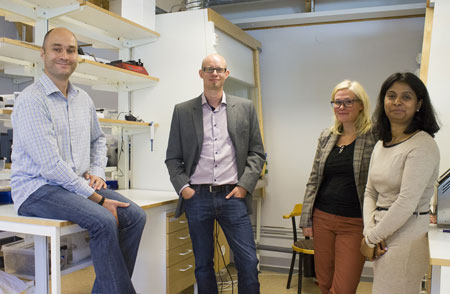| Aug 30, 2013 |
New technology scales up the production of nanocellulose from forest residues
|
|
(Nanowerk News) Luleå University of Technology is the first in Sweden with a new technology that scales up the production of nano-cellulose from forest residues. It may eventually give the forest industry profitable new products, e.g. nano-filters that can clean both the gases, industrial water and even drinking water. Better health and cleaner environment, both nationally and internationally, are some possible outcome
|
|
"There is large interest in this from industries, especially because our bionanofilters are expected to be of great importance for the purification of water all around the globe," says Aji Mathew, Associate Professor at Luleå University of Technology, who leads the EU-funded project, NanoSelect.
|
|
On Tuesday, researchers at Luleå University of Technology demonstrated to industries and researchers how they have managed to scale up nano-cellulose manufacturing processes from two different residues obtained from forest based industries. Cellulose from Domsjö in Örnsköldsvik in the form of a fiber residue that is ground down to tiny nanofibers in a special grinding machine. Through this process, the researchers have managed to increase the amount of cellulose nanofiber processing from 2 kilograms per day to 15 kg per day. Another byproduct is cellulose nanocrysals that have been successfully scaled up from 50gms/ week to 640 gms /day, using bioethanol pilot plant at SEKAB Ornskoldsvik. Both the processes have possiblity to be further scaled up and is of high interest for the forest industries.
|
 |
| From left: Professor Alexander Bismarck from Imperial College in London as a cooperative research part in the project, Björn Alriksson, SP Processum and Anna Svedberg, Domsjö Mills AB, Örnsköldsvik and Aji Matthew Project LTU
|
|
"If everything goes well, we could add value to our waste through this technology. Currently, we earn almost no money on it and as there is almost no space to store it we give it away," says Anna Svedberg, Product Engineer at Domsjö Fabriker AB.
|
|
Björn Alriksson, Research and Development Engineer at SP Processum, an organization that spans the entire forest industry also sees great opportunities in finding new products from the forest resources through this research.
|
|
"It is very relevant in the current situation because the paper industry is not good as in the past. There is a declining market, especially for newsprint and the need to find new products from the forest and therefore nanocellulose is a very interesting new product," he says.
|
|
Nano filter for purification of industrial water and drinking water is only one possible product made of nano-cellulose but cellulose has much greater potential.
|
|
Large-scale production of nano-cellulose is necessary to meet a growing interest to use bio-based nanoparticles in a variety of products, says Kristiina Oksman , Professor at Luleå University of Technology.
|
|
Nanofilters are developed today at Luleå University of Technology in close collaboration with researchers at Imperial College, London.
|
|
"We have optimized the process to produce nano filters, we can control the pore size and thus the filter porosity. It's actually just a piece of paper and the beauty of this piece of paper is that it is stable in water, not like toilet paper that dissolves readily in water," says Professor Alexander Bismarck from Imperial College.
|

